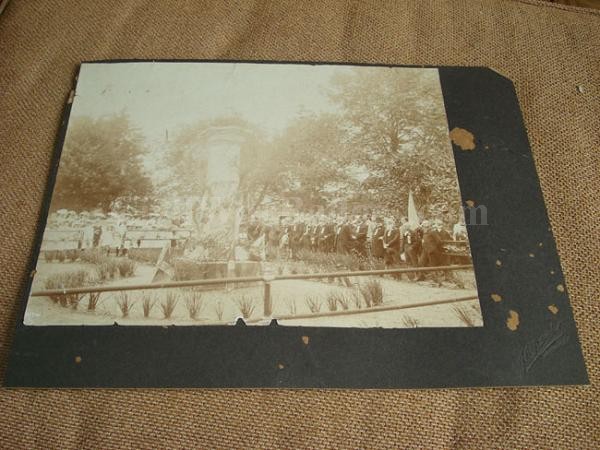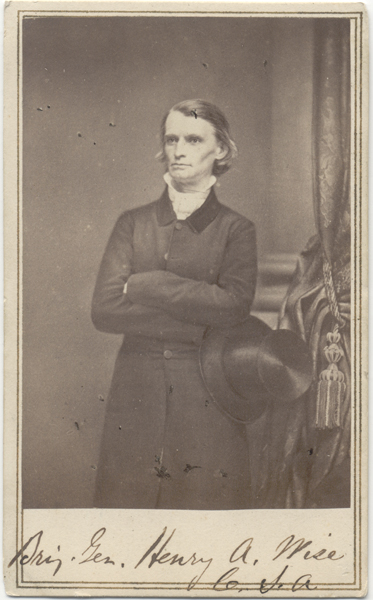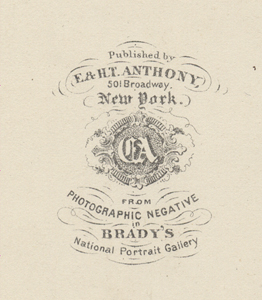BRIG. GENERAL HENRY A. WISE ~ CSA
Item #: CWB7463
Click on an image to enlarge
crisp!
Brigadier-General Henry Alexander Wise was born at
Drummondtown, Accomack county, December 3, 1806, a descendant
of John Wise, who came to Virginia from England about 1650,
and was a man of influence in the colony.
Maj. John Wise, father of General Wise, clerk of Accomack
county and twice speaker of the Virginia senate, died in 1812,
and his wife, Sarah Corbin, in 1813. Young Wise was cared for
by his kinsmen, and educated at Washington college, Pa.
After his graduation in 1825, he studied law three years with
Henry St. George Tucker, and in 1828 removed to Nashville,
Tenn., for the practice of his profession. Returning to
Accomack in 1831, he soon became prominent politically, and in
1833, as a supporter of Jackson, was elected to Congress, the
contest at the polls being followed by a duel in which his
opponent for Congress was wounded.
He was re-elected in 1835 and again in 1837, and was a zealous
advocate of the admission of Texas. In 1837 he acted as
second in a duel between William J. Graves, of Kentucky, and
Jonathan Cilley, of Maine, both congressmen, in which Cilley
was killed, and Wise was made to suffer much of the opprobrium
of the unfortunate affair.
He was very influential in causing the nomination of John
Tyler for vice-president and exerted considerable power under
his administration. Tyler appointed him minister to France,
but the Senate objecting, he was appointed to Brazil in 1844,
and remained there until 1847.
He was a Democratic elector in 1848 and 1850, and a member of
the constitutional convention of 1850. In 1855 he made a
brilliant campaign far the governorship against the Know-
Nothing party and was elected. In 1859 he published a
treatise on territorial government, upholding the doctrine of
congressional protection of slavery in the new territories.
The execution of the servile insurrectionist, John Brown,
December 2, 1859, was one of the last events of his
administration. In 1861 he sat in the Virginia convention,
and as a member of the committee on federal relations,
presented one of the three reports upon the position Virginia
should take in the crisis.
He entered heartily into the military defense of the State,
and obtained permission to raise an independent partisan
command. In May he was advised by President Davis to take a
commission as brigadier-general of provisional forces with
command in the Kanawha valley.
Reaching Charleston from a sick bed, in June, he completed the
organization of Wise's Legion, in command of which, with the
Kanawha volunteers, he endeavored patriotically to withstand
the superior forces sent against him. He fought with
intelligence and skill in the vicinity of Charleston, and
selected the position at Sewell mountain, where Lee took
command, confronting Rosecrans until that officer retreated.
In the fall of 1861 he was assigned to command at Roanoke
island, N. C., where, in his absence, many of his legion were
captured, and his son, Capt. O. Jennings Wise, of the Richmond
Light Infantry Blues, was mortally wounded.
His feeble health now kept him from the field for some time,
but in 1863 he was given command of the district between the
Mattapony and the James, with his brigade, the Twenty-fourth,
Thirty-fourth and Forty-sixth infantry, a battalion of
artillery and a squadron of cavalry.
While at Chaffin's farm, he conducted some gallant attacks
upon the enemy, and recovered Williamsburg from General Dix.
He subsequently served under Beauregard at Charleston, with
his command drove the enemy from John's island, and took part
in two battles in Florida.
Returning to Virginia in May, 1864, on June 1st he was
assigned to command the First military district, including
Petersburg. He participated in the defeat of Butler at
Drewry's bluff, and on June 15th his brigade alone held at bay
the army corps of A. J. Smith, until Lee could cross the
James.
Faithful to the last, he commanded his brigade in Anderson's
corps during the siege of Petersburg, gallantly fought in the
front line of battle March 29 and 31, 1865, and during the
retreat, on April 6th, made a gallant and successful charge
against the enemy.
In Gen. Fitzhugh Lee's report of the final operations, he
wrote most fitly: "The past services of Gen. Henry A. Wise,
his antecedents in civil life, and his age, caused his bearing
upon this most trying retreat to shine conspicuously forth.
His unconquerable spirit was filled with as much earnestness
and zeal in April, 1865, as when he first took up arms four
years ago, and the freedom with which he exposed a long life
laden with honors proved he was willing to sacrifice it if it
would conduce toward attaining the liberty of his country."
After the war he engaged in the practice of law at Richmond.
His death occurred September 14, 1876.
His sons who survived him were Richard Alsop, a distinguished
physician, and John Sergeant, captain Richmond Light Infantry
Blues, and after the war a congressman from Virginia.
Drummondtown, Accomack county, December 3, 1806, a descendant
of John Wise, who came to Virginia from England about 1650,
and was a man of influence in the colony.
Maj. John Wise, father of General Wise, clerk of Accomack
county and twice speaker of the Virginia senate, died in 1812,
and his wife, Sarah Corbin, in 1813. Young Wise was cared for
by his kinsmen, and educated at Washington college, Pa.
After his graduation in 1825, he studied law three years with
Henry St. George Tucker, and in 1828 removed to Nashville,
Tenn., for the practice of his profession. Returning to
Accomack in 1831, he soon became prominent politically, and in
1833, as a supporter of Jackson, was elected to Congress, the
contest at the polls being followed by a duel in which his
opponent for Congress was wounded.
He was re-elected in 1835 and again in 1837, and was a zealous
advocate of the admission of Texas. In 1837 he acted as
second in a duel between William J. Graves, of Kentucky, and
Jonathan Cilley, of Maine, both congressmen, in which Cilley
was killed, and Wise was made to suffer much of the opprobrium
of the unfortunate affair.
He was very influential in causing the nomination of John
Tyler for vice-president and exerted considerable power under
his administration. Tyler appointed him minister to France,
but the Senate objecting, he was appointed to Brazil in 1844,
and remained there until 1847.
He was a Democratic elector in 1848 and 1850, and a member of
the constitutional convention of 1850. In 1855 he made a
brilliant campaign far the governorship against the Know-
Nothing party and was elected. In 1859 he published a
treatise on territorial government, upholding the doctrine of
congressional protection of slavery in the new territories.
The execution of the servile insurrectionist, John Brown,
December 2, 1859, was one of the last events of his
administration. In 1861 he sat in the Virginia convention,
and as a member of the committee on federal relations,
presented one of the three reports upon the position Virginia
should take in the crisis.
He entered heartily into the military defense of the State,
and obtained permission to raise an independent partisan
command. In May he was advised by President Davis to take a
commission as brigadier-general of provisional forces with
command in the Kanawha valley.
Reaching Charleston from a sick bed, in June, he completed the
organization of Wise's Legion, in command of which, with the
Kanawha volunteers, he endeavored patriotically to withstand
the superior forces sent against him. He fought with
intelligence and skill in the vicinity of Charleston, and
selected the position at Sewell mountain, where Lee took
command, confronting Rosecrans until that officer retreated.
In the fall of 1861 he was assigned to command at Roanoke
island, N. C., where, in his absence, many of his legion were
captured, and his son, Capt. O. Jennings Wise, of the Richmond
Light Infantry Blues, was mortally wounded.
His feeble health now kept him from the field for some time,
but in 1863 he was given command of the district between the
Mattapony and the James, with his brigade, the Twenty-fourth,
Thirty-fourth and Forty-sixth infantry, a battalion of
artillery and a squadron of cavalry.
While at Chaffin's farm, he conducted some gallant attacks
upon the enemy, and recovered Williamsburg from General Dix.
He subsequently served under Beauregard at Charleston, with
his command drove the enemy from John's island, and took part
in two battles in Florida.
Returning to Virginia in May, 1864, on June 1st he was
assigned to command the First military district, including
Petersburg. He participated in the defeat of Butler at
Drewry's bluff, and on June 15th his brigade alone held at bay
the army corps of A. J. Smith, until Lee could cross the
James.
Faithful to the last, he commanded his brigade in Anderson's
corps during the siege of Petersburg, gallantly fought in the
front line of battle March 29 and 31, 1865, and during the
retreat, on April 6th, made a gallant and successful charge
against the enemy.
In Gen. Fitzhugh Lee's report of the final operations, he
wrote most fitly: "The past services of Gen. Henry A. Wise,
his antecedents in civil life, and his age, caused his bearing
upon this most trying retreat to shine conspicuously forth.
His unconquerable spirit was filled with as much earnestness
and zeal in April, 1865, as when he first took up arms four
years ago, and the freedom with which he exposed a long life
laden with honors proved he was willing to sacrifice it if it
would conduce toward attaining the liberty of his country."
After the war he engaged in the practice of law at Richmond.
His death occurred September 14, 1876.
His sons who survived him were Richard Alsop, a distinguished
physician, and John Sergeant, captain Richmond Light Infantry
Blues, and after the war a congressman from Virginia.
Promotions
| Date |
To Rank |
Full/Brevet |
Army/Vol |
Comments |
| 06/05/61 |
Brig-Gen |
Full |
Vol |
Wise Legion VA Inf |
Shipping Weight:
0.75 lb
Item # CWB7463
$175.00 USD



